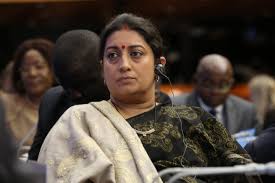The Ministry of Textiles is looking at the next two years to ensure that India is self-reliant in the space of silk, said Union Minister of Textiles and Women & Child Development Smriti Irani.
Addressing the inaugural session of the Karnataka VastraTek – Apparel & Textile Conclave, organised by the Department of Handloom and Textiles, Govt of Karnataka in association with FICCI Karnataka State Council, the minister said Karnataka reigns in the realm of silk.
“Under the Silk Samagra Program, the Govt of India dedicated specifically over Rs 2,000 crore for the development of silk. I am hopeful that the industry gives the state of Karnataka ideas, proposals or initiatives that can make our country Atmanirbhar in silk,” she said.
The recent Budget has brought cheer to the textile industry with the announcement of seven mega textile parks. Additionally, Rs 10,000 crore have been dedicated by the Govt of India for PLI schemes, specially dedicated to MMF and technical textiles.
“Just reducing the produce line to saris and garments would be doing a great injustice to the potential of the silk sector. We are aware that silk, especially the waste of a cocoon can be used by pharma and cosmetic companies. We are hopeful that industry captains can suggest usage of silk waste to help elaborate our production line or elaborate our diversification prospects,” the minister said.
On the future of textiles in the state of Karnataka, the minister said that the MSP operations for cotton procurement by the Cotton Cooperation of India has touched over Rs 359 crore in the state.
“From 2014-15 to this year, the Ministry of Textiles has extended support of over Rs 1,622 crore only for cotton procurement and MSP operations benefiting over 1.67 lakh farmers,” she said.
Highlighting the importance of the handicrafts sector, the minister said that Pehchaan Cards were distributed to over 26,000 artisans. The latest handloom census has brought to light that there are over 50,000 weavers in Karnataka who are looking at new opportunities digitally to expand their markets. She further suggested that on lines of the GeM portal that has brought on-board over 1,50,000 weavers from across the country, a similar digital opportunity is given to the marketing of artisans and weavers of Karnataka.
The textile and the apparel sector were tested as an industry during the COVID times and we rose to that challenge nationally and internationally by becoming the second largest manufacturers of PPE suits. “The fact that we could turn around our manufacturing processes in less than 60 days to meet the immediate need of our country speaks volume and is a testimony to the talent of the textile industry,” she added.
Karnataka Minister of Handloom and Textile & Minority Welfare Department Shrimanth Balasaheb Patil said that the state was the first one to implement a dedicated textile policy and has been an inspiration to other states in the country for the same.
The Doddabalapur Integrated Textile Park is the first integrated textile park of the country spread across 48 acres of land and has over 85 units focused on weaving, warping, among others and has generated employment for over 8000 people.
FICCI Karnataka State Council Chairman and Jyothy Labs Joint Managing Director Ullas Kamath said that the special emphasis given by the union Budget 2021 to the textile and apparel sector to set up large textile parks are extremely important.
The FICCI Karnataka State Council has been taking sector specific initiatives to improve industry performance. For the textile and apparel sector, we are forming a subcommittee with leading garment manufacturers and this will certainly help to bring more vibrancy, he added.





